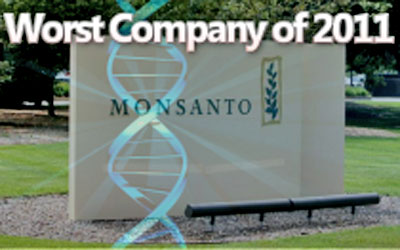|
December 6, 2011
Outside of GM seeds, Monsanto is also the creator of the best-selling herbicide Roundup, which has spawned over 120 million hectares of herbicide-resistant superweeds while damaging much of the soil.
Despite hard evidence warning against the amplified usage
of genetically modified crops, biopesticides, and herbicides,
Monsanto continues to disregard all warning signs.
Bt is a toxin incorporated in GMO crops that are intended to kill different insects, however Bt usage has subsequently spawned insect populations which are resistant to the biopesticide.
After being
exposed to Bt, many insect populations actually
mutated to resist
the biopesticide. So far at least 8 insect populations have
developed resistance, with 2 populations resistant to Bt sprays and
at least 6 species resistant to Bt crops as a whole. Farmers are
therefore forced to use even more pesticides to combat the resistant
bugs.
The research shows that this will undoubtedly
lead to insects that are resistant to the most potent forms of Bt
and other modified toxins, resulting in the use of even more
excessive amounts of pesticides in order to combat pests.
The heavily resistant weeds have an immunity to glyphosate, an herbicide that Roundup contains. These resistant weeds currently cover over 4.5 million hectares in the United States alone, though experts estimate the world-wide land coverage to have reached at least 120 million hectares by 2010.
The appearance of these superweeds is being increasingly documented in,
Of course, once again, the resistant weeds are so resistant to roundup that they require excessive amounts of herbicides.
It is no surprise that the company is refusing to accept responsibility for the escalating cost of combating the weeds, stating that,
...are a few of the countries that have decided to take a stand against Monsanto.
Hungary actually went as far as to destroy 1000 acres of maize found to have been grown with genetically modified seeds, according to Hungary deputy state secretary of the Ministry of Rural Development Lajos Bognar.
Peru has also taken a stand for health freedom, passing a monumental 10 year ban on genetically modified foods.
Amazingly, Peru’s Plenary
Session of the Congress made the decision despite previous
governmental pushes for GM legalization. The known and unknown
dangers of GMO crops seem to supersede even executive-level
governmental directives.
France is the latest nation to say no to Monsanto’s GM corn maize, even in light of an overturned ban.
It all began when France’s State
Council
overturned the ban on Monsanto’s GMO maize stating that it
was not sufficiently justified. The organization then attempted to
justify its decision by saying that the government did not give
enough evidence to justify a ban. Under law, an EU country can only
unilaterally ban a genetically modified strain if it can
scientifically prove it is a risk to the health of humans, animals,
or the integrity of the environment.
Even Nicolas Sarkozy, the current president of the French Republic, voiced his opposition to Monsanto’s GMO maize:
Genetically modified organisms will only
continue to threaten all living creatures if not stopped. It is
through spreading the word that real change will come about, and
declaring Monsanto the Worst Company of 2011 is a great way to
highlight all of their reckless actions.
|

